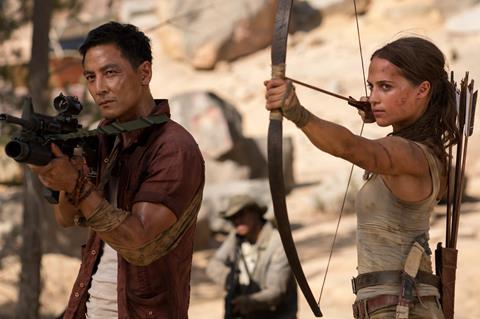Alicia Vikander takes on all-comers, including a plot which consistently threatens to capsize her efforts

Dir. Roar Uthaug. US. 2018. 118 mins.
Seventeen years after Angelina Jolie first slipped into her singlet, the 2018 Tomb Raider reboot opens with her successor, Alicia Vikander, receiving a solid punch to the face. It’s the first of many. Lara Croft is back, she’s unarmed, and fighting her way through an absurd plot with ferocious fists-of-fury.
Vikander conjures up a gutsy heroine out of thin cyberspace.
Norway’s Roar Uthaug (The Wave) directs it straight up, without even a twist of humour, bouncing Vikander from set piece to set piece with no real attempt at coherent plotting in-between. Yet Vikander is so watchable as the video-game-made-flesh, and the low-fi chase sequences can be so exciting, it’s almost enough. Almost.
This Tomb Raider arrives into a changed theatrical landscape, hostage to the thrills of Black Panther – against which the daddy issues of this rich single white avatar might look a little dated. Uthaug, with writers Geneva Robertson-Dworet and Alastair Simmons, has stripped away the cheesy genre thrills from Lara Croft, yet failed to replace them with a story. The boyish Vikander grits her teeth and faces up to the challenges laid down by this ultra-physical approach; the force of her conviction is at times enough to get you there. If the production had asked as much of its plot as it does of Vikander and co-star Daniel Wu, the end result might have been a different matter.
You can feel the beats as Uthaug hits his set pieces. A thrilling cycle chase in London is followed by a sampan romp in Aberdeen harbour, Hong Kong (South Africa subbing), where Croft encounters an ally in a drunken sailor played by Wu. From there, it’s a dramatic CGI-loaded shipwreck, a breathtaking escape from an island prison camp run by rent-a- villain Vogel (Walton Goggins), and on to the titular Tomb Raider maze of challenges; they click in like a metronome as Uthaug moves mechanically towards his two-hour running time. It’s what comes in between that’s truly deadly, though.
The viewer is introduced to a young Lara via her father, played by Dominic West in a role he’ll probably be keen to forget. A filthy-rich adventurer of sorts, he has abandoned his young daughter (awkwardly nicknamed “Sprout”) to chase one of cinema’s more ludicrous creations, a mummified Japanese goddess on a remote Asian island who holds the key to life or death. “Sprout” grows up to be a trustafarian bike courier in London, denying her heritage as the fabulously-wealthy scion of the Croft family, run by mysterious consigliore Kirstin Scott-Thomas and doddery lawyer Derek Jacobi.
Lara likes to box instead, good training for the next 120 minutes where Uthaug will take delight in smashing her face against the rocks of fate.
Eventually, Tomb Raider throws off the fig leaf of film-making and surrenders completely to its video game origins - it’s to the credit of the film’s superior action-choreography team that the chase still manages to remain thrilling as the story stops making sense. The film’s main asset is Vikander, conjuring up a gutsy heroine out of thin cyberspace. And Tomb Raider does lay to rest the Hollywood casting trope of adding a Chinese face for box office appeal in Asia and giving the actor nothing to do. Wu is given much but could have done a lot more. Playing Lara’s father, though, Dominic West is given little and accomplishes even less.
Production companies: MGM/Warner Bros
International distribution: Warner Bros
Producer: Graham King
Screenplay: Geneva Robertson-Dworet, Alastair Simmons, story by Robertson-Dworet and Evan Daughtery
Production design: Gary Freeman
Editing: Stuart Baird, Tom Harrison-Read, Michael Tronik
Cinematography: George Richmond
Music: Tom Holkenborg (Junkie XL)
Main cast: Alicia Vikander, Dominic West, Daniel Wu, Walton Goggins, Kristin Scott Thomas, Derek Jacobi






![The Brightest SunScreen[Courtesy HKIFF]](https://d1nslcd7m2225b.cloudfront.net/Pictures/274x183/3/5/0/1448350_thebrightestsunscreencourtesyhkiff_312678.jpg)















![The Brightest SunScreen[Courtesy HKIFF]](https://d1nslcd7m2225b.cloudfront.net/Pictures/100x67/3/5/0/1448350_thebrightestsunscreencourtesyhkiff_312678.jpg)

